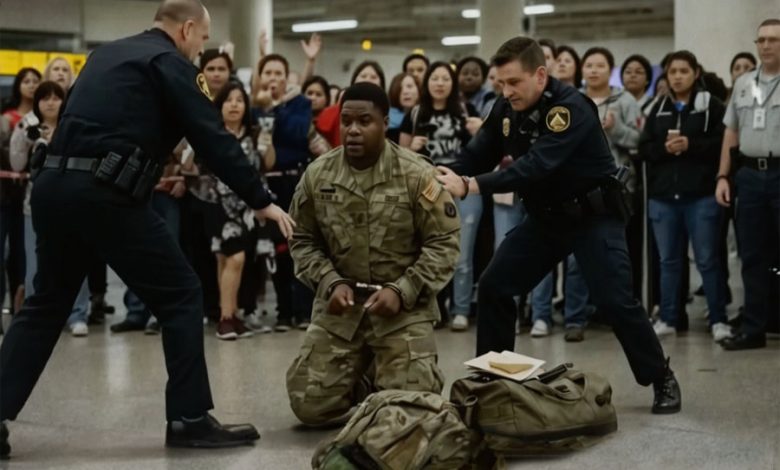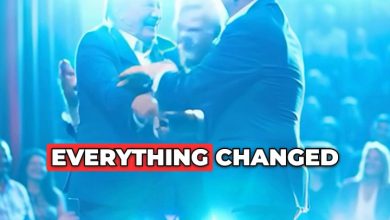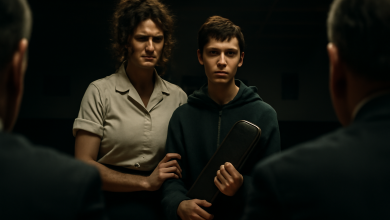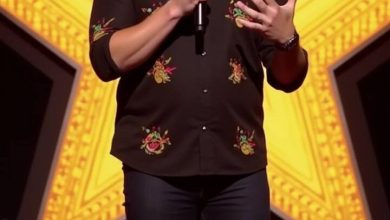Cops Arrest a Black Soldier At the Airport, Minutes Later, They Learn Who He Was …

A proud black soldier in uniform walked through the airport—only to be grabbed, shoved, and accused of theft. White officers twisted his arms, refusing to check his ID, branding him a liar. But just as hope seemed gone, justice arrived in a way no one expected.
Stay with me. Staff Sergeant Jamal Rivers had just stepped off his flight. His Army service uniform was crisp, his name stitched neatly across his chest.
Fresh from deployment, he was eager to surprise his mother in Atlanta before returning to base in North Carolina. With his duffel bag over his shoulder, he scanned his phone for a message. As he made his way toward baggage claim, he noticed the looks.
Not admiration. Not respect. Suspicion.
Airport security officers whispered. A woman clutched her purse. Two TSA agents stared as if he had done something wrong.
Jamal had been in uniform long enough to know the difference. He had seen it before—people doubting a black man could be a soldier. But this time, the tension was heavier.
At the escalator, a sharp command rang out. “Hey, you! Stop right there.”
Two police officers approached. Ryan Beckett, stocky with a heavy mustache, kept a hand on his holster. Luke Haynes, tall and wiry, glared with cold blue eyes. Jamal froze, keeping his hands visible—he knew the risk of moving too quickly.
“Is there a problem, officer?” Jamal asked evenly.
“Yeah,” Beckett scoffed. “We got a report about a stolen military uniform. And look at you.”
Jamal blinked. “Excuse me?”
“Don’t play dumb,” Haynes sneered. “Where’d you get that uniform?”
“I earned it,” Jamal said firmly.
Beckett snorted. “You expect us to believe that? Open your bag.”
A crowd began gathering. Phones lifted. A woman hit record. Jamal stood his ground. “Unless you have cause, you can’t search my property.”
“Listen here, boy,” Haynes snapped. “You’ll do what we say.”
The word boy stung, but Jamal kept control. “I’m a Staff Sergeant in the U.S. Army. Show me respect.”
Beckett smirked. “Funny, ‘cause we heard about a black male impersonating a soldier. And you fit.”
Haynes grabbed his arm. “Hands behind your back.”
Gasps spread through the crowd. A small black boy clutched his mother’s hand, eyes wide. Jamal refused to resist but stood tall. “I fought for this country. I won’t be treated like a criminal.”
Beckett ripped his duffel off, dumping his belongings onto the floor—uniforms, papers, personal items. “See? Fake,” he announced.
Haynes sneered. “Liar.”
“Call my commanding officer,” Jamal shot back. “He’ll clear this in seconds.”
Instead, Beckett shoved him against the wall. “No favors today.”
“Suspect resisting,” Haynes lied into his radio.
“Lies!” shouted a voice.
An elderly black man in a veteran’s cap stepped forward. “I’ve been watching. He’s not resisting a damn thing.”
The crowd buzzed. More phones raised. Someone yelled, “That’s racial profiling!”
The cops didn’t stop. Beckett pulled out cuffs. Haynes twisted Jamal’s arm harder.
Through clenched teeth, Jamal said, “Do you know who I am?”
“Yeah,” Beckett scoffed. “A fraud.”
Then a commanding voice boomed: “Unhand that soldier!”
Silence fell. A tall black man in a captain’s uniform strode forward. His badge gleamed: Captain Andre Maxwell.
Beckett and Haynes stiffened. “C-Captain…”
“I said unhand him. Now.”
They obeyed reluctantly. Jamal straightened his uniform, muscles aching. Maxwell turned to him. “Sergeant, are you all right?”
“I’m fine, sir. But these officers assaulted me and disrespected my service.”
Maxwell’s jaw tightened. “You two. My office. Now.”
Inside the airport security office, the air was heavy. Beckett and Haynes sat pale, Maxwell towering over them. Jamal stood tall by the wall.
The door opened. A stocky white man in a navy suit entered. Chief Walter Granger.
“Tell me what happened,” he said coldly.
Maxwell cut in before they could spin it. “They falsely accused this soldier, manhandled him, and lied on their report.”
Granger’s eyes hardened. “I reviewed the footage. The only thing Sergeant Rivers was guilty of was walking while black.”
The officers’ faces drained.
“You humiliated a decorated soldier and falsified records,” Granger continued. “Effective immediately—you’re suspended without pay. If found guilty, you’ll lose your badges.”
“Sir, this is unfair!” Haynes blurted.
“You think unfair,” Maxwell growled, “is being shoved against a wall in front of strangers for wearing your own uniform? You don’t know unfair. But you’re about to.”
Silence. Beckett slumped. Haynes fumed.
“Get out,” Granger ordered.
As they shuffled toward the door, Jamal’s voice cut through. “Next time you see a black man in uniform—show respect. We fight for this country too.”
The crowd outside erupted in applause when word spread. The veteran smiled proudly.
Later, as Jamal picked up his duffel, Maxwell placed a hand on his shoulder. “We have a long way to go. But today, we took a step forward.”
Jamal exhaled, the weight a little lighter. For once, justice had come swiftly.
They tried to strip him of dignity. They tried to twist his story. But they hadn’t counted on truth—or on a crowd that refused to stay silent.
One soldier stood tall, and this time, the system stood with him.




